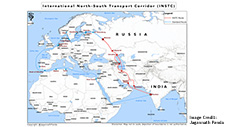Navigating BRI and Indo-Pacific Strategy: Challenge for South Asian Small States

Saroj Kumar Aryal and Manish Jung Pulami
This paper explores the intersection of China’s Belt and Road Initiative (BRI) and the Indo-Pacific Strategy (IPS) among South Asian Small States, analyzing the interplay between the two initiatives and their implications for regional geopolitics. Specifically, it aims to elucidate the synergies and conflicts between the two initiatives, assess the strategic significance of South Asian Small States, including Nepal, Bhutan, Maldives, and Sri Lanka, within this framework, and examine the implications for regional stability and national sovereignty.
It highlights the complex interplay between BRI and IPS in the South Asian Small States, characterized by economic opportunities, geopolitical tensions, and strategic maneuvering. While BRI offers infrastructure development and connectivity enhancement, IPS seeks to uphold a free and open Indo-Pacific region, leading to competition and cooperation among major powers. South Asian Small States face challenges in balancing their relationships with China and the United States, navigating great power rivalry, and promoting their national interests amidst evolving geopolitical dynamics.
Related Publications
-
Kenya and the Indo-Pacific: The Rationale for an “Outlook” and Why Kenya (and East Africa) Matters
This issue brief argues that Kenya should carefully consider promulgating an Indo-Pacific outlook given the seismic shifts in global distributions of power and the resulting great power rivalry. The future […]
-
Revitalizing INSTC: Analyzing Geopolitical Realignments and the China Factor
In recent years, the rise of Asia as the geoeconomic and geostrategic fulcrum has not only realigned global geopolitics but also reasserted the need for regional connectivity. For example, the […]
-
Navigating the Indo-Pacific: How Australia and the EU Can Partner for Peace, Stability, and Prosperity
To navigate the choppy waters of the Indo-Pacific, the EU and Australia must be on the same wavelength regarding shared interests in rules, values, and an open and liberal economic […]
-
Report of the Webinar on China’s Himalayan Hustle – Part II: Will Eco-Dominance Be China’s New War Front?
This report is an outcome of the webinar titled “China’s Himalayan Hustle – Part II: Will Eco-Dominance Be China’s New War” held on June 18, 2024. Dr. Jagannath Panda moderated […]
-
Convergence in Vietnam, EU Interests a Harbinger of Indo-Pacific Order?
In March and April, Vietnamese Foreign Minister Bui Thanh Son’s nearly back-to-back visits to the U.S. and China highlighted Vietnam’s increasing penchant for delicate diplomacy with major powers amid the […]




